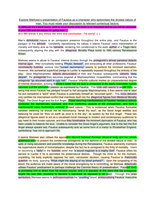Explore Marlowe’s presentation of Faustus as a character who epitomises the divided nature of
man. You must relate your discussion to relevant contextual factors.
T: Although it’s a great essay, stick to word counts (this really is an important skill as you will be penalised
in your CW and uni essays for going over…)
(It’s 595 words if you minus the intro and conclusion - I’m sorry! :( )
Man’s dichotomic nature is an omnipotent presence throughout the entire play, and Faustus is the
paragon of this leitmotif. Constantly repositioning his values, it seems Faustus’ naive interpretation of
morality and liberty acts as his hamartia, rendering him condemned to the static epithet of a Tragic Hero,
subsequently aligning the play with the allegorical Morality Plays iconic to 16th century Renaissance
Britain.
Marlowe seems to allude to Faustus’ internal division through the protagonist’s almost parodical didactic
internal agon. After conceitedly bidding “Physic, farewell”, and exhausting all other professions, Faustus’
nonchalantly hubristic venture into “cursed necromancy” seems to portend his imminent damnation.
However, this somewhat superficial pledge to Lucifer is repeatedly exposed throughout the entirety of the
play. Upon Mephistopheles’ didactic denunciation of Hell, and Faustus’ subsequently cathartic “deep
despair”, the protagonist then becomes angered at Mephistopheles’ incapabilities, commanding that the
antagonist “go accursed spirit to ugly hell.” Faustus’ infantile outburst implies an unprecedented degree
of internal dissension, echoing Aristotle’s belief that the soul is composed of the easily overridden human
rationale and the animalistic passion as expressed by Faustus. This futile oath seems to exude irony, as
being that since Faustus has pledged himself to hell alongside Mephistopheles, it then seems odd to label
his evil compatriot a “spirit” when Faustus is potentially himself an “accursed spirit”. This ironic delusion
only certifies his internalised conflict that manifests itself into the allegorical figures from Medieval Morality
Plays : The Good Angel and the Evil Angel. These recurring manifestations of Faustus’ hesitancy actively
symbolise the diametrically opposed, and thus conflicting, aspects of the protagonists’, and from a
macrocosmic view, humanity’s, innately divided nature. This is evidenced when Faustus fluctuates
between believing he should not let necromancy “tempt thy soul”, as the Good Angel testifies and
believing he could be “thou on earth as Jove is in the sky”, as spoken by the Evil Angel. These two
allegorical figures seem to act as a visualised moral message to modern and contemporary audiences to
pay heed to their innate ruptures, and thus they foreshadow the imminent damnation of Faustus, who has
been unable to balance his soul. Unable to consider the Good Angel’s argument, due to the fact the Evil
Angel always speaks last, Faustus subsequently acts as some form of a martyr to Elizabethan England,
symbolising how not to approach life.
It seems Marlowe also utilises the egocentric discord between Faustus’ physical body and his naively
gluttonous mind to present the condemned protagonist as the epitome of the divided nature of man. In
spite of rising secularism and scientific knowledge during the Renaissance, Faustus adamantly maintains
his supernatural desire of immortalisation, despite the fact he is consigned to the finity of mortality. Intent
on becoming a “deity” in the hubristic belief that “a sound magician is a mighty God”, Faustus offers his
service to Lucifer if he is permitted his preternatural desires. Though his mind is, for the moment,
unyielding, his body explicitly opposes his rash, narcissistic decision, causing Faustus to rhetorically
question his body, querying “What might the staying of my blood portend?”. Upon the congealing of his
blood, the audience are made aware of the moral wrongdoing he is committing, as Marlowe didactically
utilises Faustus’ predicament to perhaps challenge the Calvinist theory of predestination. Faustus’ body
is prompting him to divert from his chosen course, and it is arguably at this point that the protagonist
forges his own fate, choosing to become a reprobate as opposed to an elect. Through this overt
symbolism, Marlowe seems to anthropomorphise the “unwilling” blood, emblematising Faustus’ masculine





